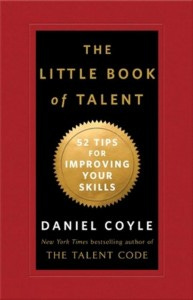The Little Book of Talent: 52 Tips for Improving Your Skills, by Daniel Coyle. New York: Bantam Books, 2012. 160 pp. $18 (hardcover).
A few years ago, on an assignment for a magazine, Daniel Coyle started visiting what he calls talent hotbeds, or “tiny places that produce large numbers of world-class performers in sports, art, music, business, math, and …



